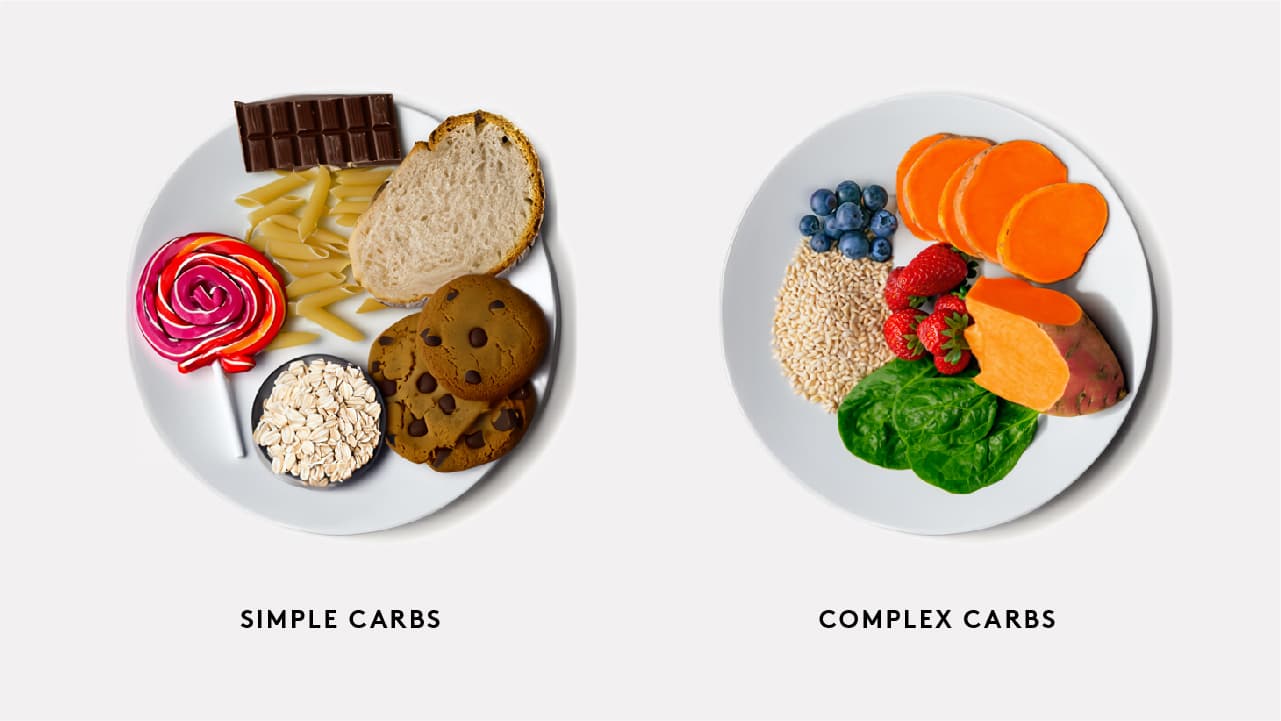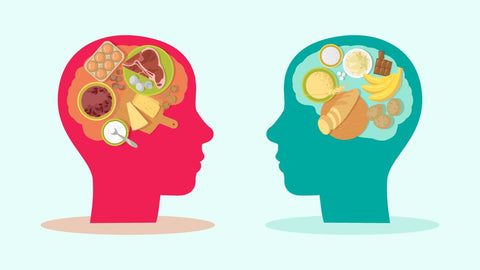Shunned by the latest dietary trends and booed at by the general public, carbs have been getting a rough deal. And despite their pleas that there's been a 'mix up', that 'not all carbs are bad' - they're often still branded as the villains of nutrition.
It's a classic tale of guilt by association.
Perhaps it's down to bad press. That rowdy rabble of 'simple carbs' hogging the limelight. Frequently hitting headlines for their associations with diabetes, heart disease and weight gain. Their bad behavior spoiling the reputation of all carbohydrates. Whatever it is, the result is a feeling of uncertainty around them. A feeling of doubt. And you know what they say:
If in doubt, leave it out.
Which is really bad news for you and the complex carbs. Because as their name suggests, there's so much more to them than just bread and pasta. And the complex carbs - they were here first. They existed long before the refined, processed ones turned up. And those complex carbs, they're the good ones. The ones we should be taking note of. Those are the best thing since...before sliced bread.
So how did we get here?
In this piece we'll look at how and why carbs got a bad rep. The difference between good and bad. Why we shouldn't fear them. And why our brains absolutely love them.
The rise of no-carb and low-carb diets

When was the last time you saw a Hollywood A-lister stopped on the red carpet and asked what diet they've followed to memorize all those lines?
Never? ...Thought so.
If our brain sat on the outside of our heads, we'd probably hear a lot more about ways to improve it. But because we can't see it, and we can't feel it, there's a tendency to almost...ignore it.
Atkins, Keto, and Paleo have all championed the no carb, low carb movement. The idea that cutting out carbohydrates, quickly leads to a slimmer waistline.
And sure, cutting out white bread, white pasta, pastries, and sodas, will probably give you some rapid results. But it's not because you've cut out carbs, it's because you've cut out bad carbs.
The conversation around carbs often follows the refined, processed, sugary narrative. Because let's be honest, nothing grabs headlines like a quick fix diet plan, promising inch and weight loss within weeks. But this has led to all carbs being filed under 'Things to Avoid'.
The good, the bad and the ugly

Largely, carbs can be categorized into two groups. The simple carbohydrates, and the complex carbohydrates. But there are some that are worse than others.
The Good: These are the complex carbohydrates boasting fibers and starches that provide sustained energy and promote digestive health. Oats, brown rice, legumes and veg all gently raise our blood sugar levels, providing longer lasting energy and keep us feeling fuller for longer.
The Bad: These are the refined carbohydrates. Stripped of their fiber and essential nutrients, these are the 'empty' calories we hear about. White bread, white pasta, and numerous snack foods fall under this category. If it's beige, be wary. These will offer you a swift energy surge followed by an imminent crash. These 'empty calorie' foods offer little in the way of beneficial nutrition. And when consumed excessively, can lead to weight gain and metabolic disturbances.
The Ugly: The sugary carbs found in candies, sodas, and baked treats. We mustn't make eye contact with these. They're the worst and perhaps the hardest to say no to. With a bachelor's degree in kerb appeal, they'll tempt us in from bakery windows and coffee shop counters.
The sirens of the snack world.
Promising a quick, feel-good hit, convenience, and temporary satisfaction. These spike our blood glucose levels rapidly and leave them crashing on the rocks shortly afterwards.
Consuming large amounts of refined carbs means we're not getting all the other nutrients we need. And since refined carbs have been stripped of any beneficial fiber, we don't feel satiated by them. And like most quick fixes, our body will soon be craving more. Which leaves us feeling hungry and looking for our next snack.
The other thing worth noting, is that in the grand scheme of things, industrialized, processed carbs as we know them today, are a recent addition to our diet. While simple sugars like honey and maple syrup have been available for centuries, the widespread availability of refined sugars and carbohydrates is a relatively recent development. We didn't evolve to need them. And as a result, our bodies have trouble knowing what to do with them.
But it's not just our bodies that are struggling. Our brains are too.
Why our brains need nourishment.

Take the neurotransmitter acetylcholine for example. It's vital to memory consolidation.
Acetylcholine is synthesized from two main components: acetyl-CoA and choline. Choline is not something the body can make enough of, it must come from diet. If we want to hold on to our memories and be able to handle those complex cognitive tasks, we need to give our brain what it needs. We need to treat it right.
What better way to show love for our brains than through food.
And if we treated our brains to a meal of their choice, handed them the menu and said, "Pick anything you like". Our brains would choose carbs. Specifically glucose. And they'd tell us to splash out, and not to scrimp on the complex ones.
Our brains consume approximately 20% of all our energy. Let's feed them the good stuff.
Why do our brains need complex carbs?
The hippocampus plays a crucial role in the formation and storage of memories. It's vital for learning. It facilitates this through utilizing neurons and glial cells. Neurons communicate through synapses, found on dendrites and other parts. Glial cells, often termed as the "supporting cells" of the nervous system, play numerous vital roles in the brain, ensuring that neurons can function effectively.
Together, they facilitate the complex networks that underpin our memory and learning processes.
Complex carbs, found in foods like whole grains, vegetables, and legumes, allow for a gradual, sustained release of energy. Ensuring a consistent energy reservoir that enables our neurons and synapses to perform optimally. The fiber-rich nature of complex carbs also contributes to a healthy gut microbiome. Which is pivotal to our cognitive and emotional well-being through the gut-brain axis.
- Memory: Adequate glucose levels support sharp, robust memory and cognitive functions.
- Concentration and focus. A steady source of energy translates to enhanced concentration, focus, and a decrease in mental fatigue or 'brain fog'.
- Stress management: Carbohydrates, especially those found in whole, nutrient-dense foods, can modulate serotonin production by increasing the availability of its precursor, tryptophan, to the brain. Careful consumption can potentially enhance our mood.
Complex carbs are the only carbs to help your brain function at its best. Refined carbohydrates, like those in sugary drinks and white bread, quickly spike our blood sugar levels. When this happens, the brain gets a burst of energy (glucose), but it's short-lived and followed by a rapid drop. This up and down energy rollercoaster can lead to feelings of fatigue and brain fog, making it harder to focus, remember things, and manage stress.
What do our brains want us to eat?
Our brains are incredible. They work tirelessly round the clock. And even when our bodies have clocked off and put their feet up, our brains are still beavering away. Consolidating memories from the day and clearing out toxins. So they need a diet rich in both complex carbohydrates and healthy fats. Complex carbs provide a sustained energy release, whilst healthy fats, especially those brimming with omega-3 fatty acids, support the structure and functionality of our brain cells.
According to neuroscientist and author Lisa Mosconi, the top five foods for our brains are:
Water

About 75% of our brain is made up of water. And not drinking enough, can actually make your brain shrink. Water helps your brain cells communicate with each other. It helps transport nutrients to your brain and clears out toxins and waste that can impair cognitive function.
Even 2% water loss due to dehydration can cause neurological symptoms such as brain fog, fatigue, and delayed reaction times. It's worth noting, the water you drink should have natural minerals in it, so if it doesn't, look into taking a mineral supplement.
Berries

When you think about it, the berry part of the plant is the bit that carries new life. They contain one or multiple seeds that can spawn new life. It's the bit that makes sure the next plant has all the nutrients it needs to develop and carry on the species. So they're going to be jam packed full of all the things we need too.
All the good stuff goes on in the berry.
They're rich in antioxidants which neutralize free radicals to protect neurons from damage and inflammation. They contain vitamin K which is associated with supporting neuron health and cognitive function.
They also carry a good amount of glucose - the brain's preferred source of energy. And fiber to support digestive health. Which has an indirect benefit for the brain via the gut-brain axis.
Dark Leafy Greens

These have been identified as one of the foods that might have specific benefits for brain health. Leafy greens are one of the prime sources of vitamin K, which has been shown to support brain health and protect against mental decline as we age.
Greens like kale and spinach are rich in vitamins A and C, both of which are antioxidants that help combat oxidative stress in the brain.
They're also rich in polyphenols which have anti-inflammatory and antioxidant properties. Some polyphenols are believed to offer neuroprotective effects which can potentially slow cognitive decline.
Extra virgin olive oil

This type of oil is a great source of vitamins E and K. Vitamin E has antioxidant properties, and when combined with vitamin C, studies indicate it may help to maintain a good memory, slow memory loss and is associated with reduced prevalence and incidence of Alzheimer's disease.
Caviar

Finally, and a slight curve ball: Caviar. Maybe not the most accessible food, but we can see why it's on the list. It ticks so many of the boxes. Firstly, it's rich in omega-3 fatty acids, particularly DHA (docosahexaenoic acid) and EPA (eicosapentaenoic acid), which are crucial for brain health.
Caviar is also high in quality proteins which are broken down into amino acids and used in the synthesis of enzymes, neurotransmitters, and other critical molecules in the brain.
Caviar is rich in B12 which is vital for maintaining nerve health by aiding in the production of the myelin sheath that protects nerve fibers in the brain. Sufficient levels of B12 are also associated with healthy aging and cognition.
Caviar contains choline which, as mentioned earlier, is utilized in the synthesis of acetylcholine, a neurotransmitter essential for memory and communication among brain cells. It also carries minerals and antioxidants which help protect cells from free radicals.
Now, caviar does tick all boxes, but it is quite expensive. And it's not to everyone's taste. The good news is, you can get a lot of the above benefits from salmon, mackerel, sardines and most fatty fish. The bad news is, if you're vegan, on your lunch break, or simply don't like the taste of fish, it can be harder to get all those benefits in one convenient place. Which was one of the reasons we came up with Nu:tropic®.

Nu:tropic was formulated specifically for your brain.
Nu:tropic is a really convenient and accessible way to ensure you're doing your bit for your brain. Studies have shown that people who develop cognitive impairment in later years, show accelerated changes in brain activity, long before the onset of symptoms. So anything we can do to look after our brains now, has got to be good for us later down the line. Swapping your daily snack bar for a Nu:tropic® bar is a good place to start.
How does Nu:tropic® help look after my brain?
Firstly, it's a snack bar. So instead of reaching for those cereal bars that look like they're good for you, but are actually full of refined sugars and carbohydrates, swapping out one daily snack for a Nutropic® bar is a small, but smart switch to make.
Each ingredient has been carefully researched and selected for its neuroprotective properties.
Norwegian Black Oats

Grown in Norway's pristine natural environment, on a small traditional family run farm, our black oats are 40% richer in essential fatty acids than regular oats. It was horses that gave us the heads up that black oats were better than white oats. Given the choice, horses chose the black oats, and what was witnessed was those horses were able to run faster and were a lot calmer.
Black oats provide complex carbohydrates for sustained mental energy. And, they're more resistant to disease, so they don't need to be treated with pesticides.
Choline

Choline is one of the most important nutrients for optimal cognitive function. This essential brain nutrient cannot be produced in the amount needed for human requirements, so it must be consumed through diet. Our clean, bioavailable choline is produced with advanced NutriGenesis® nutrition technology. Based on Nobel prize-winning research.
DHA Omega-3

DHA accounts for more than 90% of the omega-3 fatty acids in the brain and up to 25% of its total fat content. Nutropic® provides preformed DHA derived from algae - not fish, making it simple for vegans and non-vegans to meet their daily Omega 3 requirements.
Phosphatidylserine

Just like DHA, phosphatidylserine (PS) is a key building block of the brain cells. Supplemental PS is absorbed efficiently across the blood-brain barrier. And combining PS-DHA has been shown to significantly enhance cognitive function.
Prebiotic Fiber

A happy gut makes for a happy brain. We use high-quality prebiotic fiber from chicory root originating in Europe. Prebiotic fiber promotes healthy intestinal microflora, which directly influences the brain via the brain-gut-microbiome axis.
Nutropic® bars are also packed with vitamins and minerals as clean, bioavailable NutriGenesis®. Including essentials D3, B12, and magnesium.
Final thoughts.
Your brain is the control center for everything you do.
Everything starts with your brain.
But the mainstream tends to treat diet like fashion. Focusing on looking good on the outside. However, it's not just that. While the research underlining the significance of nutrition for our brain is abundant, it doesn't always get published in accessible language or appear in your daily newsfeed. So, if this isn't something that's been on your radar, it's not surprising.
At Performance® Lab, we want to cut through the noise, arm you with science, and provide clean, effective, research backed products that put you in control.














